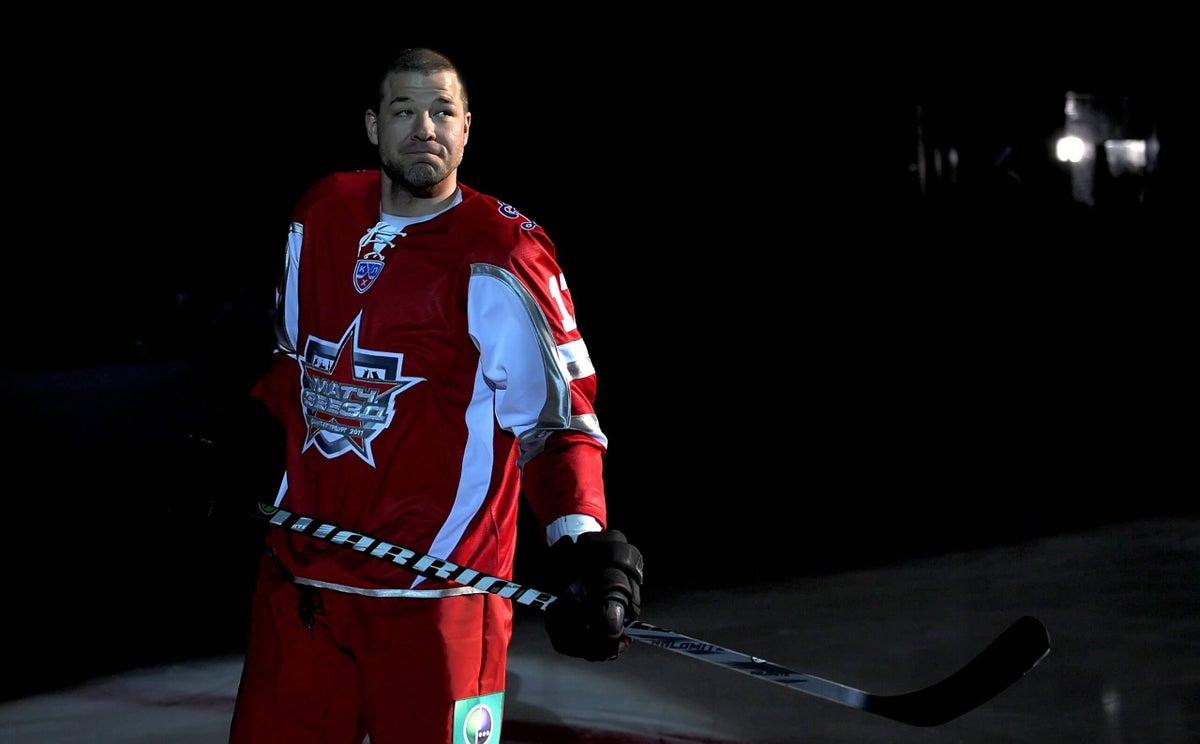Chris Simon, a two-time NHL All-Star who won a Stanley Cup with the Colorado Avalanche in 1996, had stage 3 chronic traumatic encephalopathy (CTE) when he died by suicide in 2024, according to a post-mortem brain tissue analysis released by his family and the Concussion Legacy Foundation (CLF) on Monday.
Simon played for seven franchises during his 15 seasons in the NHL. He went on to play in 174 games in the KHL before retiring from professional hockey in 2013.
“Mr. Simon had severe CTE pathology in areas of the brain involved with cognition and mood regulation, and it is likely CTE contributed to his memory problems, depression, and apathy,” Dr. Ann McKee, chief of neuropathology for the VA Boston Healthcare System, said.
A gritty left winger, Simon fought more than 100 times and accumulated 1,824 penalty minutes as a professional.
Immediately following his death in 2024, Simon’s family attributed his suicide to CTE. While it is not possible to diagnose individuals with the neurodegenerative condition while they are alive, symptoms such as emotional volatility and memory loss can help doctors identify potential cases.
“Chris was suffering tremendously from CTE. We saw him declining but did not know where to turn to for help,” Simon’s parents and sister said in the statement. “Chris’ short-term memory issues were ongoing for many years. We also learned that he had lost most of his hearing, had daily headaches, light sensitivity, paranoia, was easily frustrated with tasks, had extreme anxiety, difficulty navigating in a vehicle, apathy- lack of feeling and emotion, impulsivity, distancing himself from those who meant the most to him, had executive dysfunction – meaning he couldn’t plan or problem solve and he had suicidal thoughts at times.”
According to his family, Simon had “distanced himself from his family and friends the last three years of his life.” They said the CLF diagnosis will help bring his loved ones some closure.
“The Chris we knew had been gone for quite some time. Looking back, we now realize that Chris likely started suffering from CTE in his late 20s to early 30s,” they said. “Our entire family suffered for many years as we saw our son, brother, father, husband slip away from us and we couldn’t do anything to help him.”
During his NHL career, Simon scored 161 goals and added 168 assists. He competed in 75 playoff games, including the Avalanche’s first Stanley Cup run, and returned to the Stanley Cup Finals with the Washington Capitals in 1998 and the Calgary Flames in 2004.
A player known for delivering hard hits and often initiating altercations, the NHL suspended Simon eight times over his career. He missed a total of 65 games due to suspensions, including a 30-game suspension in 2007 that ranks among the longest in league history.
In that incident, Simon pulled the Pittsburgh Penguins’ Jarkko Ruutu to the ice and stomped on his leg with his skate. Simon, who was playing for the New York Islanders, subsequently took an indefinite leave from the team to seek counseling.
“I have enjoyed a long career achieving my dream of being a player in the National Hockey League and I’m proud of my accomplishments,” Simon said in a statement apologizing to Ruutu at the time. “But I acknowledge that time and assistance is needed before I return to the game.”
Simon filed for bankruptcy in 2017, saying he could not work due to CTE and other injuries he sustained during his playing career. He began collecting disability payments earlier that year and also joined a class-action lawsuit over the NHL’s handling of head trauma. The lawsuit was settled in 2018 for $18.9 million, though it’s unclear how much of that money Simon received.
In their statement announcing his CTE diagnosis, Simon’s family lamented “the negligence of a professional league turning a blind eye to CTE and other significant brain injuries sustained in the sport of hockey.” The statement specifically pointed to NHL Commissioner Gary Bateman’s history of disputing the connection between CTE and hockey.
“We listen to the medical opinions on CTE, and I don’t believe there has been any documented study that suggests that elements of our game result in CTE. There have been isolated cases of players who have played the game [who] have had CTE. But it doesn’t mean that it necessarily came from playing in the NHL,” Bettman told NPR in 2023.
The CLF said 19 of 20 NHL players’ brains studied at Boston University’s CTE Center, including Simon, have tested positive for CTE. It noted the diagnoses of former players Bobby Hull, Ralph Backstrom, Stan Mikita, Bob Probert and Derek Boogaard were included in a 2024 study by the university that “found the odds of developing CTE increased by 34 (percent) for each year of hockey played.”
A request for comment from the NHL was not immediately returned.
If you or someone you know is having thoughts of suicide, call or text 988 for the Suicide and Crisis Lifeline, or contact the Crisis Text Line by texting TALK to 741741.
(Photo: Yury Kuzmin/KHL Photo Agency via Getty Images)

